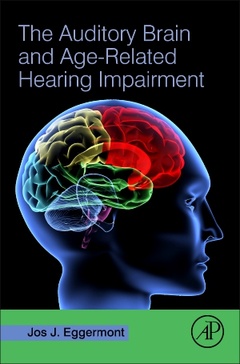Description
The Auditory Brain and Age-Related Hearing Impairment
Author: Eggermont Jos J.
Language: English
Subject for The Auditory Brain and Age-Related Hearing Impairment:
Keywords
Attention; Audiogram phenotypes; Audiovisual; Audiovisual interaction; Auditory brainstem responses; Auditory evoked potentials; Auditory learning; Auditory nerve; Brain atrophy; Brain imaging; Brain stem; Brainstem; Cochlea; Cochlear implants; Cognitive function; Cognitive testing; Correlation matrix; Cortex; Default mode and salience networks; Dementia; EEG; Efferent system; Evoked potentials; Gap detection; Genes; Graph theory; Hair cells; Hearing aids; Hearing loss; Heritability; Hidden hearing loss; High-frequency audiogram; Informational masking; Lifespan; Listening effort; MRI; Midbrain; Mild cognitive impairment; Mismatch negativity; Mitochondria; Neural connectivity; Neural synchrony; Neuropsychology tests and event-related potentials; Neurotransmitters; Noise exposure; Noise-induced hearing loss; Olivocochlear bundle; Otoacoustic emissions; P300 and MMN; Preattentive evoked responses; Presbycusis; Processing speed; Quality of life; Reaction time; Reactive oxygen species; Resting-state; Spatial hearing; Speech understanding; Speech-in-noise; Speech-perception training; Structural and functional coupling; Structural changes; Temporal fine structure; Temporal processing; Tinnitus; Vestibular problems; Working memory
296 p. · 15x22.8 cm · Hardback
Description
/li>Contents
/li>Readership
/li>Biography
/li>Comment
/li>
The Auditory Brain and Age-Related Hearing Impairment provides an overview of the interaction between age-related hearing impairments and cognitive brain function. This monograph elucidates the techniques used in the connectome and other brain-network studies based on electrophysiological methods. Discussions of the manifestations of age-related hearing impairment, the causes of degradation of sound processing, compensatory changes in the human brain, and rehabilitation and intervention are included. There is currently a surge in content on aging and hearing loss, the benefits of hearing aids and implants, and the correlation between hearing loss, cognitive decline and early onset of dementia.
Given the changing demographics, treatment of age-related hearing impairment need not just be bottom-up (i.e., by amplification and/or cochlear implantation), but also top-down by addressing the impact of the changing brain on communication. The role of age-related capacity for audio-visual integration and its role in assisting treatment have only recently been investigated, thus this area needs more attention.
Section I. Manifestations of Age Related Hearing Impairment1. Hearing and the auditory brain in the elderly2. Age-related changes in auditory sensation3. Age-related changes in auditory perception4. Aging, Cognition and Dementia
Section II. Causes for Degradation of Sound Processing5. Temporal processing deficits in aging and the role of cognition6. Genetic and environmental factors in age-related hearing impairment7. Animal models of auditory aging
Section III. Compensatory Changes in the Aging Brain8. Changes in the brain connectome with age9. Age-related electrophysiological changes in the auditory brain
Section IV. Rehabilitation and Intervention10. Improving quality of life with hearing aids and cochlear implants
Appendix. A primer on auditory evoked potentials and magnetic fields
- Relates the techniques used in the connectome and other brain-network studies to the human auditory-cortex and age-related hearing loss research findings
- Examines the side effects of age-related hearing impairment and their impact on the quality of life for the elderly
- Evaluates the importance of multi-modal means in the rehabilitation of the elderly with hearing aids and cochlear implants
- Discusses the role of neurostimulation and various training procedures to halt, or potentially reverse, cognitive decline in the elderly




